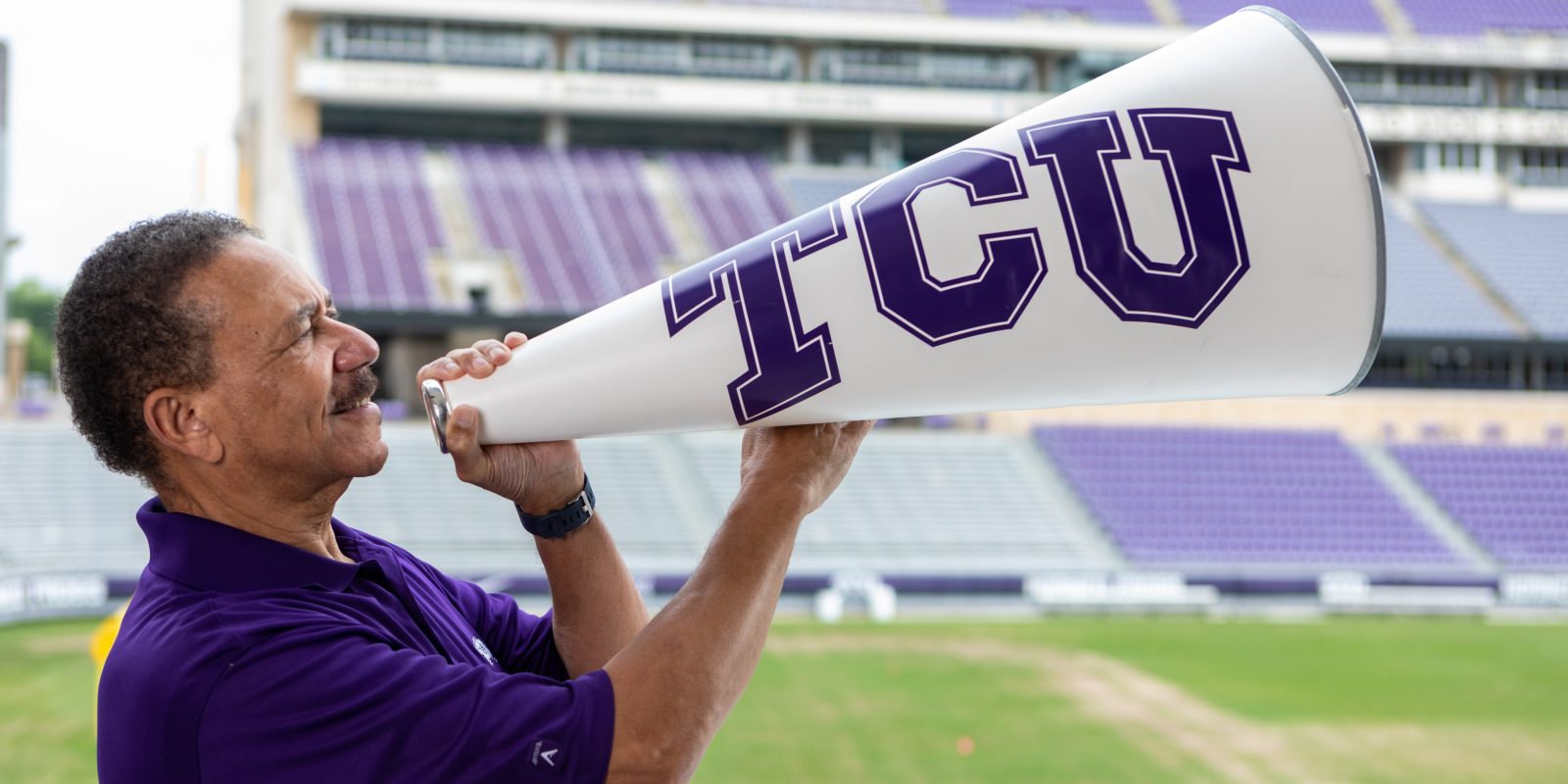
Photo by Vishal Malhotra
Attorney Ron Hurdle Broke Barriers at TCU
From the university’s first Black cheerleader to a top attorney, the alumnus leads wherever he goes.
Ron Hurdle ’71 nearly dropped out of college his first semester at TCU. Failing grades derailed his pre-medical plans and shattered his confidence — until a friend asked him to be in a play.
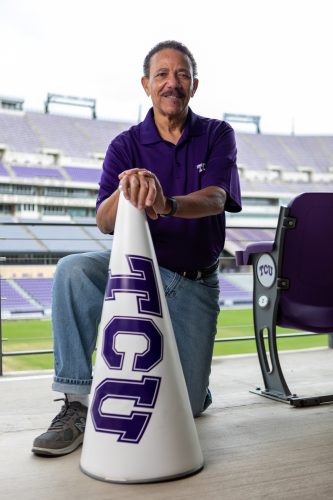
“Over the years I’ve learned to become very patient. If you see things as an end goal, you miss a lot along the way. Take your time and enjoy life. The benefit is in the process. You learn, grow and develop,” says Ron Hurdle. Photo by Vishal Malhotra
“I think that experience is what gave me the drive to get degree after degree after degree,” said Hurdle, who, in addition to his TCU BFA in theatre, holds master’s degrees in management, business administration and law, plus a juris doctorate. “I kept trying to prove to myself that I could do it.”
Finding theatre and connecting with students ignited a new self-assurance in Hurdle. He was elected TCU’s first Black cheerleader in 1969, and he racked up a handful of degrees on his way to starting his own law firm.
Breaking Barriers
TCU began integrating in 1962. By the late ’60s, the Black student population was small, and the students all knew one another, Hurdle said.
“After we got settled in, we decided what we were going to do to integrate ourselves into the life of TCU,” Hurdle said. “I chose to run for cheerleader.”
At the time, cheerleaders were elected by the student body.
“We did a lot of campaigning on campus and singing in the dormitories and food halls,” said Larry Dickson ’69 of Laguna Woods, California, the elementary school friend Hurdle followed to TCU. “We would sing, ‘Vote for Ronnie Hurdle.’ It was kind of corny, but it was fun.”
“The election was one of the highlights of the year because he was running,” Dickson said. “He got a lot of votes from everybody on campus — there was no way he was going to win with just minority votes. So I think he influenced relationships on the campus in a positive way.”
When Hurdle was elected cheerleader his junior year, he became the first Black cheerleader at TCU and in the Southwest Conference. He was elected again his senior year.
Joining the cheerleaders provided new perspectives, Hurdle said, but not all were positive.
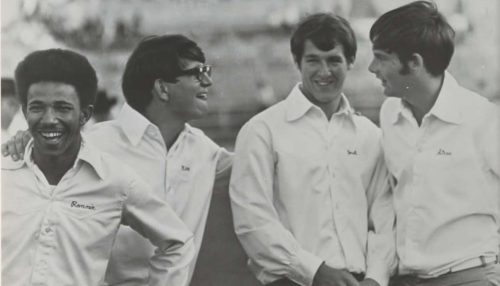
Ron Hurdle, Mark Hill, Josh Huffman and Steve Benton, from left, cheer in the 1970-71 season. Courtesy of TCU Special Collections
In 1970, the cheer squad traveled to the University of Wisconsin as the Horned Frogs faced the Badgers in football. At the hotel in Madison before the game, a TCU administrator called a meeting with the spirit team. He said he didn’t want the squad to do any drills that involved physical contact like lifts and group stunts.
“So I said, ‘These are the same cheers they’ve been doing for the last two years. It looks like the only difference is instead of a white girl and a white guy, now you’ve got a white girl and a Black guy. Is that the reason?’ He admitted that he had gotten some complaints from alumni who didn’t think the school was ready to get to this point,” Hurdle said. “I was really surprised and really happy that the rest of the squad stood up and said, ‘This is what we’ve been practicing all year, and we’re not going to change it. We’re going to do drills just like we’ve always done them.’ I felt good that they were supporting me.”
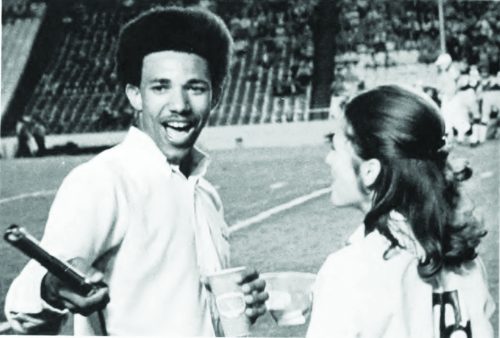
Hurdle talks with Susan Beard. Members of the squad had to campaign for votes from the student body to earn a cheerleading spot. Courtesy of TCU Special Collections
Because of that peer support, Hurdle considers the experience among his favorite TCU memories.
“I met a lot of lifelong friends at TCU. It was a good experience other than the few issues that I had with people who felt like we shouldn’t be there or that we shouldn’t have been in the roles we were in.”
In hindsight, Hurdle said he believes his experience strengthened him. “I think it toughened me up and made me understand what it would be like in a majority environment.”
From Naval Officer to Telecom
Following graduation, Hurdle considered going to New York “to try to do great things” in theatre but instead chose a less uncertain path and enrolled in the U.S. Navy Officer Candidate School. He served as a weapons officer aboard an ammunition ship and then as a discipline officer — the second in command to the legal officer — at the naval station in Charleston, South Carolina.
Because of the travel, the Navy wasn’t a long-term career option for Hurdle, who didn’t want to leave his family for long stretches. After his honorable discharge in 1974, he wasn’t sure what he wanted to do. His job search led him to opportunities in the telecommunications industry, first with Southwestern Bell’s management training program, then as a sales manager in the marketing department. He moved on to cable sales for various companies before joining AT&T. When the telecom giant went through a merger and downsized the computer division where Hurdle worked, he had an open door for a career change.
“I wanted to do something where I could be independent,” he said. “When AT&T offered the opportunity to take a buyout, I was able to get some funds and take time off to get my law degree.”
Passion for Law
Hurdle was 43 when he went to law school. “I wish I had gone in my mid-20s so I could have enjoyed the career longer. I like the independence. I like to get up and persuade people and to argue particular points of view,” he said, noting his theatre background serves him well. “I don’t have stage fright or jitters like a lot of people do because I’m familiar with how to get in front of people and present and articulate an argument.”
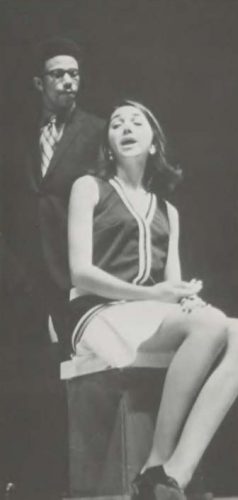
Ron Hurdle and Pam Webb acted in The Man Nobody Saw during Howdy Week 1970. Courtesy of TCU Special Collections
When he graduated from law school, jobs were scarce. While working for a small criminal law firm in Dallas, he submitted a résumé to Allstate to work as staff counsel. He promptly received a denial letter.
“About a year later, I got a call from someone from Allstate saying they had my résumé,” he said. “I went in and interviewed, and I got the job. I kept that denial letter as proof that you should never give up.”
After beginning as an in-house trial attorney, he was promoted to lead attorney and eventually team leader, managing 10 or so other attorneys and support staff.
“Ron was a very good trial lawyer,” said Pat Collins, Hurdle’s boss for about a decade at Allstate. “He’s very smart but also very organized. To be a good trial lawyer you not only have to know the law, but when you get ready to go to trial, you have to have your case very organized so that you can deal with everything that comes up. You need to know where to look quickly to find answers to the surprises that you get.”
Hurdle spent a dozen years at Allstate and then held similar positions at Nationwide, The Hartford, Liberty Mutual and Fred Loya insurance companies, accumulating more than 20 years of defense trial work.
The biggest challenge was handling the tremendous volume of work, he said, noting that one year he tried 14 cases. “I learned to understand the importance of processes. It’s like the old assembly line: If you do everything the same way over and over, it makes you more efficient.”
Hope in Future Generations
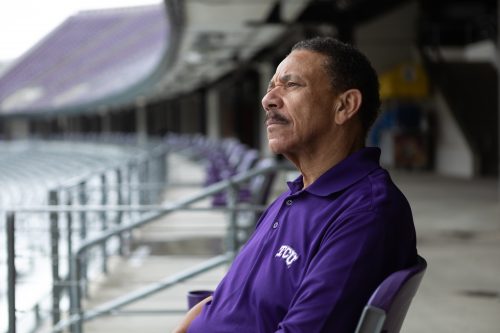
In his role as an adjunct professor at the new UNT Dallas College of Law, Ron Hurdle focuses on the practical aspects of practicing law. Photo by Vishal Malhotra
Hurdle opened his own law firm in 2018. He focuses on personal injury, family law and probate matters. “One of the advantages of having a law degree is you can do a lot of things independently. You don’t have to work for someone,” he said. “The firm is not very active or aggressive — it’s just me. But it gives me the opportunity to continue practicing law at the level and speed that I want to.”
He is also an adjunct professor at the new University of North Texas at Dallas College of Law. “I’ve always wanted to work with young lawyers,” he said. “I focus on the practical aspects of practicing law so that when they graduate, they can go out and practice law on their own.”
Looking ahead, Hurdle is also eager to spend more time with his grandchildren — twin boys and two girls. He said he is optimistic about what the future holds for upcoming generations.
“I think we made a lot of progress in racial equality and justice in the ’70s and ’80s, but I think we may have lost of some of that,” he said. “I’m excited about this new group of young people. They’re issue-conscious and bringing these back to the forefront. It’s a stressful time. It’s a time of division. But I think that creates an opportunity. I’m looking forward to what my grandkids are going to do and what their kids are going to do.”

Your comments are welcome
7 Comments
Ronnie, or “Hurk” as we called him, campaigned for cheerleader by singing songs to other students eating in the Student Center. We mostly picked girls to serenade and they made their campaign song sound like a love song. It worked, most of the student body then were female. After he got elected I answered his dorm room phone and listened to callers threatening to,kill him if he touched a white girl. Some said they would shoot him.
Ron was brave, talented, embraced life as a pioneer.
Hi Ronnie.
What a great story! I didn’t realize that you had such a interesting and diverse work experiences throughout your life.
Larry has told me a lot about his time at TCU.
It would be nice to hear more about yours.
So congratulations to you for all your accomplishments.
Kind regards,
Richard
Many congrats, Ronnie Hurdle as I knew you during my undergraduate years at TCU. What an excited morning it has been to read of your success over the years! Those of us who were undergraduates, supported you from the stands during many-a-football game!
Thanks to you, Jennifer and Sterling who welcomed the incoming class of 1969 to the campus. We were less reserved to be accepted. I can’t say I had an experience as you shared. However, as the only full-time day student of color in Journalism, rather quiet and somewhat reserved, I did not feel the need for competition. Nonetheless, thanks again to you upper classmen and women for paving the way to the rest of us as we endeavored to earn our degrees and press forward.
Best wishes to you and yours as you continue to climb the ladder of success.
Respectfully,
Helen M. Sherman Dillard
Class of 1969 – 73
College of AddRan
Hey Ron, This is a terrific article! I knew you were a cheerleader, but had no idea that you were making inroads by being the first Black cheerleader at TCU. Amazing!! We met during our first year in law school and have formed a professional bond that has spanned over 30 years. Kudos to my brother-from-another-mother!! I am proud of all that you have accomplished. Keep on keeping on!
/Sharon Cushingberry a/k/a “Cush”
I was there that night when Ted Coonfield was answering your phone and you were receiving various threats. I lived across the hall in Tom Brown and I remember how you broke down and said it was too much. It was a very emotional moment, but I encouraged you to stand tall and hang in there…and you did a great job! You made history that night.
My brother and friend … such an inspirational journey. I have always admired your leadership skills and abilities in the variety of settings that we share and this article puts much in perspective. Your authenticity with others and empathy in perspective about equality for all is observed and appreciated Ron. The world is a better place because you are in it. May the Lord continue to bless, keep, and use you in servant leadership as you imoart wisdom and knowledge. Thank you for talking the talk and walking the walk.
IHS,
Ed Moore
Thanks for featuring this amazing inspirational leader. Thank you Ron for your leadership and sacrifice ( known and unknown). We salute you.
Ann Tasby
Director, TCU Neeley Office of Inclusive Excellence.
Related reading:
Alumni
Jennifer Giddings Brooks Reigns On
TCU’s first Black homecoming queen now has her own educational consulting group.
Alumni, Sports: Riff Ram
First Person with Lindsay Shoulders Westbrook ’06
The spirit coordinator and Showgirls director brought the iconic white boots to Horned Frog game day.
Sports: Riff Ram
Maggie Martin Leads the Dutchmen
In purple and white overalls, the senior leads the TCU student sections on game day.